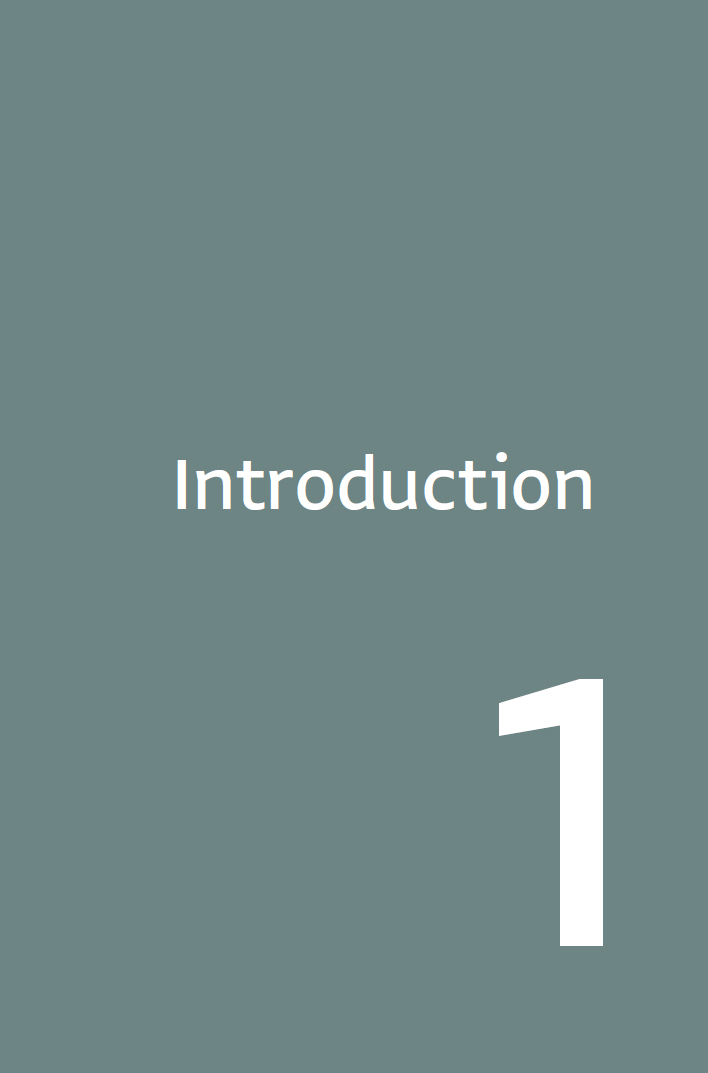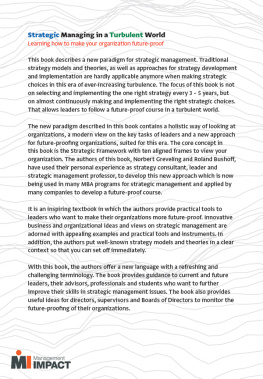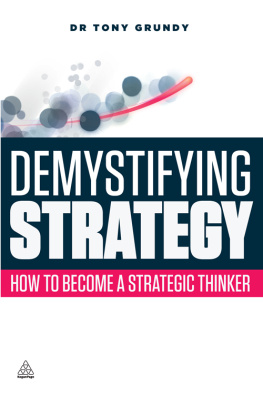The publisher is fully aware of its responsibility to ensure optimum reliability. Nevertheless, we cannot accept liability for any inaccuracies that may appear in this publication.
2019 Norbert Greveling and Roland Bushoff/Management Impact, Deventer, the Netherlands
All rights reserved. No part of this book may be reproduced, stored in a database or retrieval system, or published, in any form or in any way, electronically, mechanically, by print, photo print, microfilm, or any other means without prior written permission from the publisher.
Prologue
T he idea for this book was created on Thursday evening, May 25, 2017. After an intensive squash competition between the two of us, we were chatting at the bar. Roland said that two days earlier he had been talking with several fellow strategic management teachers from Business School Netherlands. While discussing the study program of strategic management, they concluded that it needed an up-to-date textbook for this subject. The available management books on strategic management mainly contain strategy models and theories, which were developed in the last century. This all before or at the very beginning of the digital revolution. While Roland was still explaining the problem, Norbert came up with a solution: Why dont we write that book?
At that time, Norbert had already been busy for some time with a new management book. Ever since studying business administration and management science at the university, he has been intrigued by the complexity of organizations and has been looking for ways to understand and reduce it. He wants to better understand what the success of organizations is based on in general. Whether traditional thinking about success is in line with current developments, but he also wonders what role leaders play in this to realize future success. He had already written a few Dutch management books about these topics, but his search did not end there. His explorations and increasing understanding of, for example the digital revolution, have since resulted in innovative insights into this matter. At the time when Roland came up with his story, Norbert was busy writing a new book.
Soon the idea was born to make these insights part of a new textbook on strategic management. However, the implementation of that idea was not that simple. The basic idea behind a textbook is to describe existing theories and not to introduce new theories. We decided to do the latter anyway, by showing how existing theories fit within the basic theory described in this book. In this sense, this book has not become a traditional textbook. It is written as a textbook for (future) leaders in organizations, but also as a manual for leaders who want to make their organization future-proof and reflect on that process.
This book could not have been made possible without years of interaction with many people, such as (former) colleagues, clients and the numerous MBA/DBA students whom we have taught over the years. Thank you very much for that! We would like to address a special word of thanks to our partners, Ms. Trea de Jong and Ms. Jacqueline Vleeshouwers, for their enthusiastic support and for the time they have given us to write this book. In addition, we thank the co-readers from whom we have received very valuable feedback from different perspectives. Many thanks to Toni Sfirtsis, Robert Voogt, Pieter de Vries, Raymond Horsting, Wil Snijders, Bernd Steinmann, Kirsten de Wilde, Danille Bergacker, Pamela Greveling, Melissa Greveling, Martijn Kruijzen and Paul Handgraaf for their great tips and advice! Furthermore, we are very grateful to Business School Netherlands and Management Impact for their trust in us as authors. Finally, we thank you, readers, for reading this book. After all, we have written it for you. We sincerely hope that you will gain a lot of new insights and inspiration from it and wish you lots of reading pleasure!
NORBERT GREVELING and ROLAND BUSHOFF
Preface
Not long after my summer vacation, I received the semi-finished manuscript of this text-book. Still somewhat open-minded just after this recess, I communicated to the authors that I was very impressed and was pleased that it had not become a book for wimps, meaning to say that the book contains various innovative concepts which would set you thinking, as a manager, entrepreneur and leader, but also to encourage and enable you to apply these concepts.
In this digital age everyone deals with a massive number of uncertainties and it is said that strategic management is very important for organizations. But who or what helps you realize this? This book does! It clearly shows what the core tasks of leaders are in their quest for the future success of their organizations. It will show you the strategic focus areas which need to be focused on and which tools are needed to apply this. It will also show you which steps you must take, being a secure leader, to complete such a process. This book will describe the journey that you embark on, a journey of discovery that I have not seen described elsewhere.
The book does not only pay attention to Osterwalders well-known Business Model Canvas, but it will go further by embedding this canvas in a broader picture. Several canvases are being conjured up, which will leave the reader in awe. Would this show the right way to arrive at a future-proof organization? It might just do that! I challenge you to read this book, reread it and consider putting into practice what you have learned from it.
It is definitely a textbook in which many aspects are discussed that influence future-proofing. As a reader you hope for syntheses, final conclusions, good introductions, relevant examples, enlightening visualizations and a summarizing overall chart to keep a perspective. I was pleased to see that it was all there. The book is a welcome enrichment in a time of ever-increasing turbulence. Moreover, because of the various exercises, I think it is quite suitable as a workbook for managers, entrepreneurs and leaders.
As dean of Business School Netherlands, I am proud of this result and of the fact that the authors are senior lecturers of Strategic Management at our Business School. With their innovative and refreshing views, they actually support MBA and DBA students and other (future) leaders in tackling challenging strategic management issues.
MARCEL VAN DER HAM, dean of Business School Netherlands

O ver the past decades the professional field of strategic management has produced various interesting models and theories. However, many of them do not fit in well with the strategic issues of todays leaders. That is not so much because of the theories and models themselves, but because of the turbulence which constantly continues to build up. Important and basic assumptions, which used to be the foundations of these theories and models, no longer apply in this day and age. Future-proofing of organizations is becoming less and less self-evident due to technological, social and political developments. There is more reason than ever to manage strategically! But how?
In this book we will outline a contemporary paradigm for strategic management with new theories. Such as: how you can look at organizations and think about future successes, about the core leadership tasks and about an approach to the strategic management process itself. We are not trying to improve the professional field itself, but hope to guide and inspire leaders with whom we work every day and who we regularly witness struggling with strategic issues. By starting from the idea, that there is nothing as practical as a good theory, we want to provide guidance to leaders by means of this new paradigm, which we worked out in three parts. But first, in this introductory chapter, we will look at the development of the strategic management field in recent decades, the turbulence faced by leaders and the need for a new paradigm.














